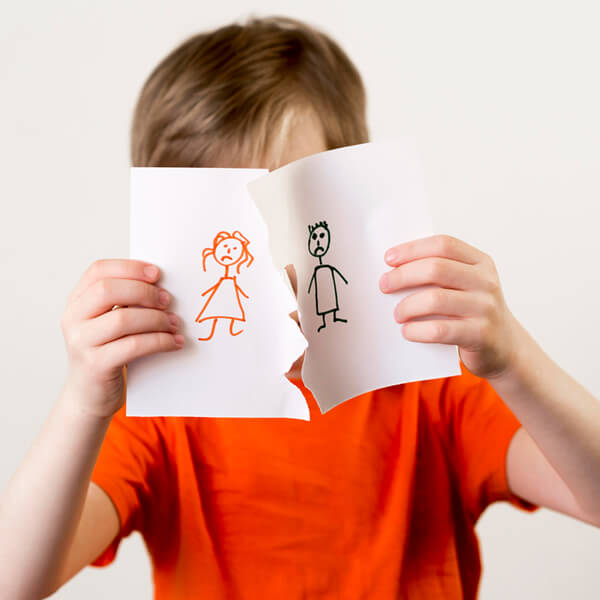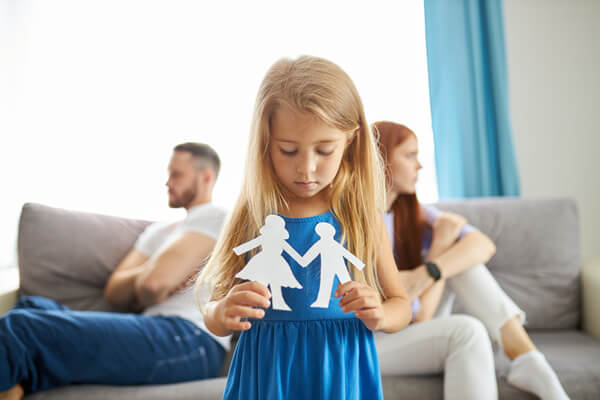Discussing Separation or Divorce with Children
Separation and divorce is fraught with emotional upheaval and adjustments; and as parents, sharing the news with your children can be a very challenging moment. However, as difficult as that moment can be, there are compassionate and effective communication strategies that can significantly influence how your children navigate the forthcoming loss and all of the changes and adjustments that go with it.
When discussing separation and divorce with your children, it’s important to keep in mind that the goal is to deliver the message with warmth, clarity and simplicity. What exactly you share and how you share it should be determined by your child’s age and his or her comprehension level and emotional maturity. In my opinion, a structured, yet flexible, outline can guide the conversation in a reassuring and comforting manner. Your outline for your children could include the reasons for your separation (e.g., that mommy and daddy will always love one another as mother and father and as a family but no longer as husband and wife), the impending changes that will impact them (e.g., visitation and living arrangements) and the areas of their lives that will remain the same (e.g., if they’re staying in the same neighborhood or school). The outline serves as a guide rather than a stringent script, ensuring a natural and fluid conversation.
Offer a consistent message. Despite your personal differences and the upset that led to your separation as a couple, as parents, it’s best if you can present a unified front and narrative to your children. This necessitates agreement on how to explain the reasons for your separation and what changes will ensue. By doing so, you will reduce the risk of confusion and further emotional distress. For example, instead of saying “Your father and I can’t live together anymore”, consider phrasing it as “We have decided that it’s better for everyone if we live in different houses.” When circumstances allow, both parents should engage in the discussion. This not only breaks the news but also reassures your children that, despite the changes in your marital status, you remain committed to their well-being as loving parents.
Steer clear of the blame game. The focus of the conversation should be on the changing family dynamics and not the assignment of blame. Negative remarks about one another can inadvertently harm your children emotionally and can potentially cause lasting damage. Try to keep your language neutral, and if larger issues are at play (e.g., an extramarital affair) be mindful of what you share with your children and how you share it.
Maintain a balance between change and consistency. Children often find solace in routines and familiarity during uncertain times. So, assuring them about the aspects of their lives that will remain the same, like their school or activities, is a good thing. Simultaneously, as parents, you will want to prepare them for any upcoming changes, such as new living arrangements, to mitigate surprise or shock.
Encourage open dialogue without pressure. As parents, it’s important to promote an environment where your children feel comfortable asking questions. However, understand that many children need time to process the information, and if your children aren’t ready to talk immediately, it’s best if you reassure them that they can always approach you later. Letting your children know that you love them very much and are always there for them is what’s most important.
Provide time for adjustment. For children, adapting to challenging new realities takes time, and the news of separation and divorce is a lot to make sense of. Thus, it’s normal for children to exhibit a variety of emotions or even appear unaffected initially. Be patient and understanding and allow your children the space and time that they need to come to terms with their new circumstances.
Offer repeated reassurances. Your children will need a lot of reassurance and support during their transition from being an intact family to being a separated and divorced one. Your children may worry if the love they’ve always believed in and relied on from you as parents will be there in the same ways as their family dynamic changes. Again, regularly reminding your children that your love for them as parents is steadfast and will never change is a good thing to do.
Expect a variety of reactions. Every child is unique and will process the news of separation and divorce differently. Some might express sadness, others may vent their anger, and some might not visibly react at all. Regardless of your child’s response, it’s crucial to validate his or her emotions and assure them that it’s normal to express whatever thoughts or feelings they are having.
Focus on a brighter future. While it’s necessary to acknowledge and work through the present challenges, it’s also helpful for your children to see the potential of a brighter future as a family. Perhaps, as parents, you can slowly encourage your children to view this transition as a period for personal growth while also acknowledging the current and unfolding difficulties. If you’ve been in one unhappy marriage or home for a while, it’s best to focus your children on the goal of two happy homes and your shared visions of that.
Divorce is a challenging journey for families and discussing it with your children can be daunting. However, with careful planning, open communication, and an emphasis on reassurance, positivity and patience, your initial conversation on the topic can serve to alleviate some of your children’s anxieties and guide them through this transition in a healthy way. You will likely have many talks about your family and all of the changes divorce brings, and your children will need you to be there and to be strong and loving during those talks.
In the end, the most important thing is ensuring your children feel continuously loved and supported throughout this process. With your guidance, they can not only cope with these changes but also learn invaluable life skills of resilience and adaptability.
Lastly, some children struggle more than others during or after divorce, and it’s important to turn to the professionals if the hurt and the upset becomes too much to handle. Professional resources, such as family therapists or child psychologists, can provide additional support during this period if needed.








Michael Oberschneider, Psy.D. “Dr. Mike” is a clinical psychologist in private practice.
He can be reached at 703-723-2999, and is located at 44095 Pipeline Plaza, Suite 240, Ashburn.
